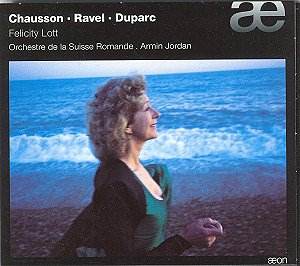The French label AEON,
though specialising in French contemporary
music, does not neglect classics, albeit
those of the late 19th or
early 20th centuries, as
with the present release.
Chausson’s large-scale
Poème de l’Amour et de
la Mer Op.19, which the
composer dedicated to Duparc, is one
of his unquestionable masterpieces.
This almost symphonic song-cycle on
poems by Maurice Bouchor is a considerable
achievement in its own right. It roughly
falls into two parts (La Fleur de
l’eau and La mort de l’amour
linked by a short orchestral interlude).
The composition of this masterpiece
took Chausson ten years of hard and
painstaking work: the first part was
started in 1882 and orchestrated in
1890 whereas La mort de l’amour
was completed in 1887, although the
closing section of the second part (Le
Temps des lilas) was published separately
in 1886. Chausson’s symphonic preoccupations
are clearly emphasised by the recurrent
statements of several themes ensuring
the organic cohesion of the whole work
which might otherwise have been a mere
collection of songs knit together in
a more or less artificial or superficial
way. The musical phrase, to which the
words le temps des lilas is set,
is particularly important in this respect
(indeed, most of the interlude is based
on it while it keeps surfacing throughout
the whole work).
Henri Duparc’s reputation
rests on a mere handful of beautifully
crafted songs. In this respect, he is
almost unique in the whole history of
music; but this alone would not be enough
to ensure his outstanding position.
His songs, that he painstakingly chiselled,
belong to the finest ones ever written
in France and elsewhere. Some of them,
such as Phidylé
heard here, have become fairly well-known,
popular even, and deservedly so. In
his Baudelaire setting, L’Invitation
au Voyage, Duparc
does not set the central part of the
poem, so that the finished song displays
a clear bi-partite structure, made the
more coherent by the repeat of several
words and phrases (and their musical
equivalents) common to the poem’s outer
sections. In this, Duparc’s setting
is quite comparable with Chausson’s
Poème de l’Amour et de
la Mer, albeit on a smaller,
but nonetheless perfectly achieved scale.
This and the moving Chanson triste
are minor masterpieces.
Ravel’s Shéhérazade,
one of his earliest masterpieces, is
a setting of three poems by Tristan
Klingsor (pseudonym of Arthur Leclère)
that may now seem rather dated, but
that provided Ravel with many opportunities
for either lushly coloured or refined
scoring, which is the trademark of mature
Ravel. Though already displaying a number
of Ravel fingerprints, the music as
a whole still nods towards some of the
composer’s predecessors such as Fauré
or, to a certain extent, Duparc; but
much of this wonderful score is pure
Ravel.
Dame Felicity Lott’s
affinity with the French repertoire
is well-known as is the Orchestre de
la Suisse Romande’s long association
with this repertoire, first with Ernest
Ansermet, later with Armin Jordan. So,
in short, here is a recital of French
orchestral songs performed by artists
with a long expertise of the music.
Add to this, that these works are superbly
recorded; and you will need no further
recommendation.
Hubert Culot
